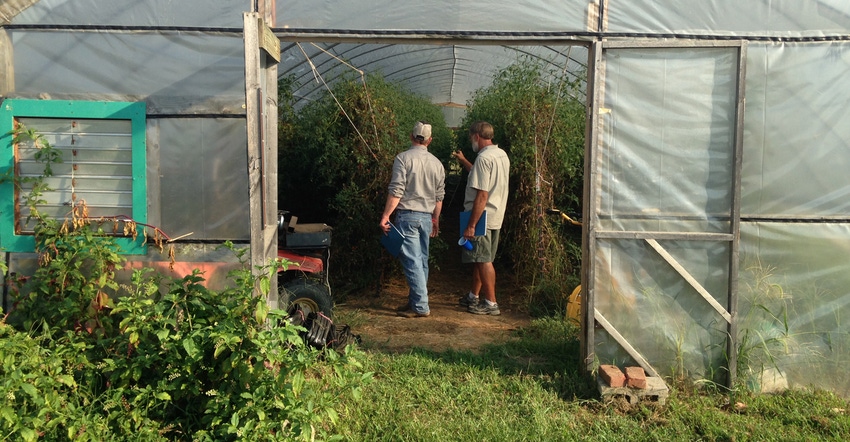
Growing specialty crops to market through food co-ops or at farmers markets is a growing niche in agriculture across the country. Kansas is no exception, especially in regions of the state that are an easy travel distance from a population center.
The Kansas Rural Center is responding to this trend with a series of workshops designed help growers and would-be growers meet each other and hear from experts on specialty crops.
Next in the series will be a workshop in Erie, Kan., on March 31.
The all-day workshop will be from 8:30 a.m. to 5 p.m. at the Courthouse Meeting Room, 100 S. Main St. in Erie. The $15 registration fee will pay for materials and lunch. The deadline for registration is March 27.
Those who would like to register early can sign up online.
The workshop will help beginning specialty crop growers learn what they need to know to get off to a successful start, such as information on conservation, production and marketing. It will also give them a chance to get to meet and learn from experienced growers.
David Coltrain, a southeast Kansas native who worked in the Kansas State University system for 10 years, will do a presentation answering the question, “What’s Special about Specialty Crops?” that will look at current production, historical production and future potential for specialty crops in Kansas. He will also tackle the issue of economics and enterprise budgets.
Coltrain has recently returned to his home roots, and is gearing up to grow and market vegetables and fruits in Southeast Kansas. During his career, Coltrain worked at Seward County Community College as an agriculture instructor, and he established a specialty crops demonstration area consisting of four acres of conventional garden, 5000 square feet of high tunnels and 3600 square feet of greenhouses.
Coltrain was an Extension agent for Kansas State Research and Extension for 10 years, and worked in KSU’s agricultural economics department in business development. He began his career as a seedstock swine producer and vegetable grower in southeast Kansas. His education from KSU includes a bachelor's in horticulture and a master's in agriculture economics.
Information on accessing the many resources that are available to help specialty crop growers be successful in their operations will be provided. Organizations that offer resources to specialty crop growers include: Kansas Department of Agriculture; K-State Research and Extension; USDA groups, including SARE, NRCS, RMA, FSA; and farm credit lenders. A representative from one of the groups will be on hand to talk about the resources, and to answer questions. This session will also provide a list of websites with important information for growers.
Calvin Parker will talk about growing vegetables for farmers markets. Parker owns and operates a small farm which produces specialty produce. Parker was a cement chemist who turned to farming after retiring. He and his wife started by determining what crops their farm was best suited for on a small scale and built up from there. Parker will demonstrate techniques that have worked for him, along with some that have not been as successful.
Parker utilizes techniques that conserve water and fertilizer and lead to earlier production, which helps mitigate heat, insect and moisture problems. Parker grows tomatoes, new potatoes, onions, cabbage, peppers, cucumbers cantaloupes, radishes, lettuce, green beans, sweet potatoes, and other vegetables, and sells them at the farm and at the farmers markets in Allen County. The Parkers also donate produce to area food pantries.
Mike Schoenecker, of Chanute, Kan., has grown vegetables all his life, and he has been selling at farmers markets for nearly 30 years. Currently, Schoenecker markets at the Kansas Grown Farmers Market in Wichita, Kan. He grows a variety of vegetables such as cool-season crops like lettuce, cabbage, broccoli, cauliflower and peas. Warm-season crops grown include tomatoes, cucumbers, green beans, melons and squash. Schoenecker will discuss his growing techniques, which include drip irrigation and straw mulch, and will emphasize the importance of composting and building up soil health.
Cary Rivard, Extension specialist and director of the Olathe K-State Research and Extension Center, will discuss the importance of post-harvest coolers in specialty crop production. Rivard is responsible for conducting applied research and Extension activities in the area of fruit and vegetable production. His current research investigates the use of grafted tomatoes for organic and conventional production. He also conducts research in high tunnels, and is responsible for maintaining the hightunnels.org website.
The workshop will feature information about the robust community of Amish specialty crop growers that reside in southeast Kansas and their unique marketing model. Labette County is home to an Amish community that has become an important part of specialty crop production in Kansas. Amish specialty crop growers in southeast Kansas approached auctioneer John Nichols about starting a Produce Auction, which has now been running for about five years. Every week from April through October, specialty crops are sold to many different types of end users, ranging from individuals to supermarket chains.
Tammy Klenklen owns and operates Oz Country Mercantile & Produce in Erie, Kan. Klenklen is a former FedEx truck driver who grew up outside of St. Louis with no background in farming. Her operation grew out of a flower gardening hobby, and really blossomed after she attended a meeting about starting a farmer’s market in the Erie area. Klenklen received her first EQIP Grant in 2015 and her second in 2017. She is entering her third season of farming full time. She and her husband now have three high tunnels and have a total of ½ acre in diversified vegetable production. She and her husband sell at 3-4 farmers markets weekly and from their farm store at home. Along with vegetables, they sell jellies, raw honey, homemade lip balms, herbs and dried pepper powders. A tour of Klenklen’s farm will close out the day.
About the Author(s)
You May Also Like




